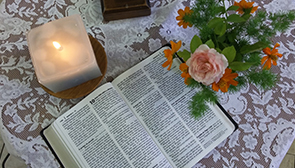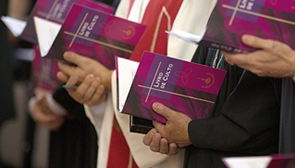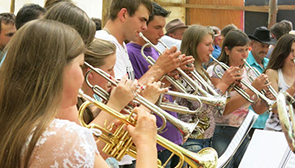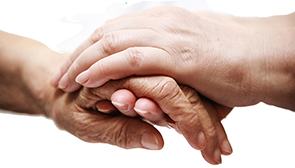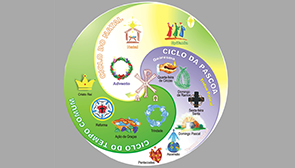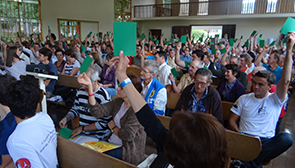Bible Study 14.
Pastor Belinda Colindres.
Iglesia Cristiana Luterana de Honduras (ICLH).
Translation: Elisa Pérez Trejo.
“Consider and call for the mourning women, that they may come; and send for wailing women, that they may come.”
Jeremiah 9:17
With these lines from the book of Jeremiah, I want to invite you to read the context in chapter 9.
The Population of Israel was going through suffering, anguish, death, sadness, pain and uncertainty. Its context is ours, In the time of Covid-19.
The objective of going through this story is not to minimize you for your tears but to lift your face and recognize our strength and the favor of The Holy Trinity for those who cry for justice.
“Women whose job is to lament
The women whose job was to make lamentation were called mourners and weepers. These women were paid to cry at funerals. They were hired by the relatives of the deceased for different reasons, it could be for culture, because they believed that their crying helped to cleanse the soul of the person who died or because in some cultures they were forbidden to cry in public.
Today there are women who mourn, some of them mention that they no longer work because the culture is dying, but still they exercise to participate in demonstrations and cultural festivals. When asking what is your strategy for crying? they manifest remembering their painful experiences, this causes feelings to surface.
Now that we know a little more about them, we can continue with the story.
God sends women to be called and asks that they intercede for the people and that they move others.
We can see that God recognizes the work of women, recognizes their office, but also recognizes the feeling.
Let us reflect for a moment with the following questions:
Why do you think it was necessary to call women to do the same thing Jeremiah did? Could it be that they had a different formula than Jeremiah? Could it be that their tears were different?
To answer them, let's move on to remembering the context of women in the Bible. Let's take into account:
- The patriarchal world in which biblical writings were born.
- The position of women in these writings:
- They were lower than man.
- Their only functions, procreate and serve.
- Lacking rights.
- Silenced.
- The exclusive readers of these writings, men.
- The authorities and guides, men.
In conclusion, women were limited to listen, obey and to keep silent. Having enormous differences between the great benefits of man and the misfortune of having been born as a woman in a world led by men.
If we remember the words of the current mourners: I remember my painful experiences and the feelings and the tears come out we can see that the mourners that the story tells us about in Jeremiah's story, had infinite reasons for tears and feelings to come out. Although her tears were paid (and possibly poorly paid) it did not mean that they were unsentimental or unrealistic.
These women went through so much injustice and oppression that made their feelings a source of income.
Now we can reflect on our questions:
Why do you think it was necessary to call women to do the same thing Jeremiah did? Could it be that they had a different formula than Jeremiah? Could it be that their tears were different?
I think that there is no more sincere request than the one that is born from the one who is suffering.
It was the women who lived punished by patriarchy, just for being women, and, it is always God who reminds patriarchy and ourselves that this punishment is imposed by society and has nothing to do with His plan of love, equality, fairness and justice.
I want to take you now to our context.
Women all over the world are shedding our tears.
The mother cries for her hungry, sick, and murdered sons and daughters.
Daughters cry for the violence their mother suffers at the hands of the father, the boss, the friend, the boyfriend.
Women cry for the impotence when they do not gather the necessary courage to denounce their aggressor and cry with indignation when the authorities do not listen to them.
We all cry when we know the names of our murdered sisters.
In ¨Times of Covid-19¨ our tears are born and continually slip down our cheeks, there are thousands of women who, like the mourners and weepers, cry for a salary, for bread, for a crumb.
Thousands of women cry because they have lost their jobs, because they do not have food for their family, because they do not have the measures to prevent the spread of the virus.
Thousands of women are surviving with their aggressor in time of confinement, crying silently.
None of us is exempt from these situations in which we become mourners.
Does the connotation sound familiar to you, mourners?
Women have always been given different names for the freedom to shout and cry injustices, fears, uncertainties, solidarity; They have called us: the weaker sex, weeping, dramatic and exaggerated, but only we and God Himself know that they contain our tears and regrets.
I propose a final exercise.
Let's put ourselves in the shoes of others.
1. Remember Mary, chosen by God to bring her Son into the world. Let us think of her tears at seeing her Son die unjustly in the most humiliating way. (John 19:25)
2. Remember Naomi and her daughters-in-law, think about their tears when they are separated after spending so many joys and sorrows together. (Ruth 1: 6-9)
3. Remember your tears when you cried out to God making that request that only he could hear.
What do they tears and regrets have in common?
Were they weak women?
Were they women who faced adversity?
Conclusion:
¨In times of Covid-19¨ Women continue to be the mourners and weepers. You will see women lamenting and crying for the pain of others, lamenting and crying for their own pain.
God recognizes our tears, knows that our wailing and crying are born from the heart and are real.
For centuries we have been heirs of this virtue that patriarchy has denied to our brother men. In the midst of the adjective weak sex, the power of God is contained, perfecting ourselves. (2 Corinthians 12: 7-10)
There are many women who in Covid-19's time wept whole nights, we cried out to God like the mourners of Israel, finding hope and comfort.
When morning comes, God's mercy has perfected us and made us stronger.
This is when the woman who sells fruit on the street takes her basket and heads to get the bread for her family.
It is there when the woman who weaves, takes her threads and undertakes a new art.
It is there that the violated woman takes courage and denounces her aggressor.
It is there when the weeping woman, without receiving more payment than freedom, than bread, than joy, that physical and spiritual mental health gives its face for itself and for others.
Women who show their faces, women who give their tears.




